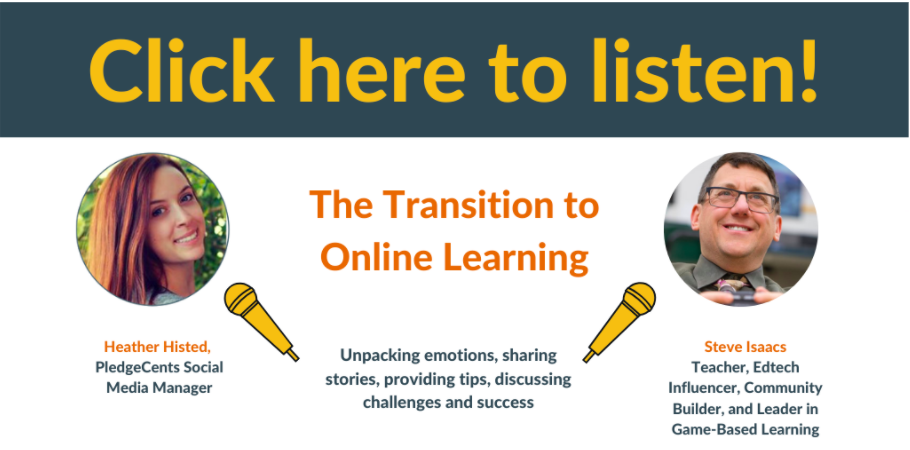PledgeCents LIVE with Steve Isaacs
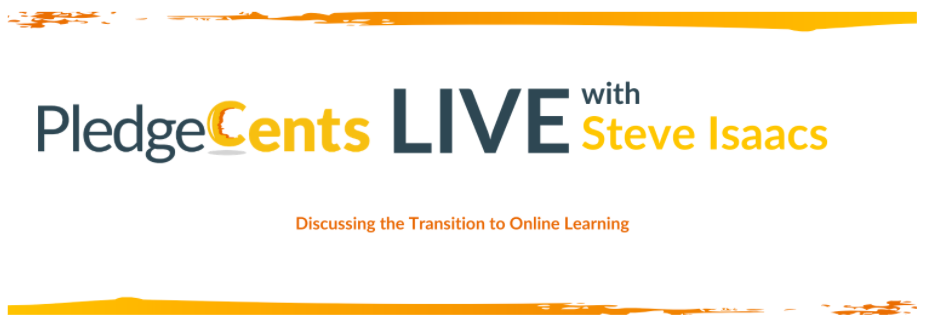
Many educators and school professionals across the world have transitioned, quite abruptly, to online learning. For many, this was and still remains a stressful and difficult time. Many education professionals have their own families at home to care for, including coordinating the online learning for their children. Additionally, many families now have the additional burden of assisting with distance learning while balancing work from home duties. With all of this uncertainty we know one thing for sure: we are all in this situation together.
We recently had the incredible opportunity to join educator and edtech influencer, Steve Isaacs, on Periscope to discuss the transition to online learning. Our discussion covered everything from general challenges, to helpful resources, to discussing silver linings, to contemplating the impact of the coronavirus epidemic on not only the future of in-person education but also conferences as we know them. Check out the main talking points of our live chat outlined below and also be sure to watch the full video for more in depth discussion!
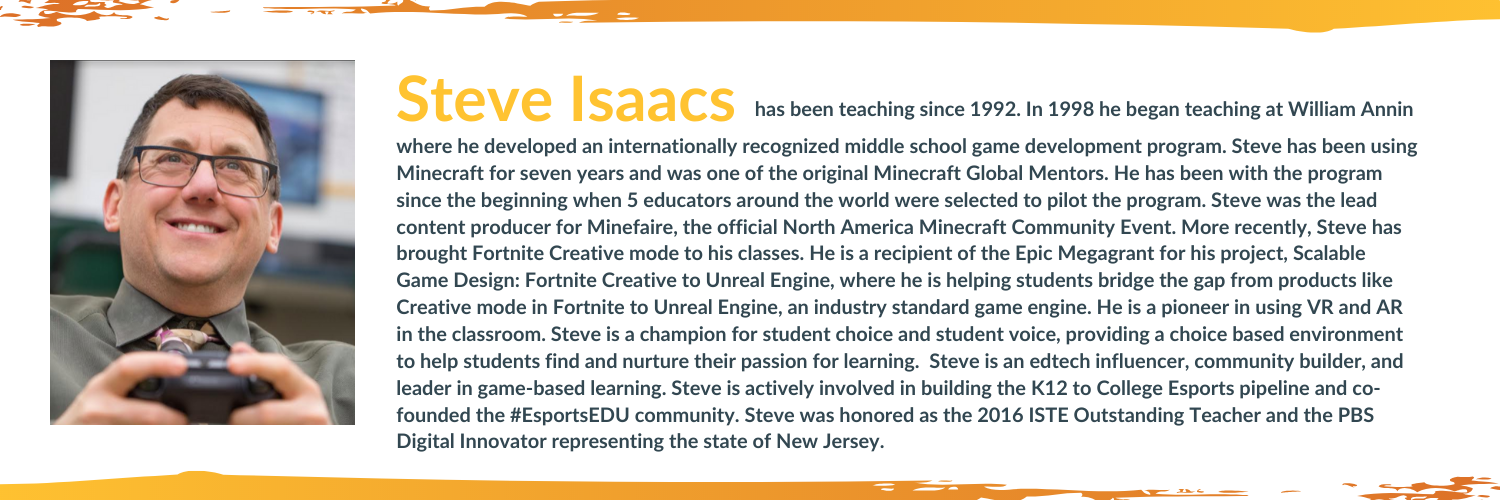

Monitoring student participation / engagement in an online environment: Many educators have classes size of 30+ students which can already be difficult when it comes to tracking engagement with face-to-face learning… add distance learning into the mix, especially in situations where you are not directly working with the students through even video chat as often as you wish, and this becomes an extra challenge. We discussed some strategies that may be helpful, including a system that works in Steve’s classroom. He shares how he uses Google forms to not only measure student participation, but also to facilitate communication and encourage reflective thinking. However, he also notes that this process is time consuming (although valuable!) What are some strategies that you have used to monitor student engagement and participation?
Limited or absent opportunities to provide verbal feedback: We all know that a combination of verbal and written feedback is beneficial to help students obtain a deeper understanding of the material, their work, and further reflect upon their performance. But what happens when many educators are limited in opportunities to provide verbal feedback to their students? Some districts have restricted video conferencing with students, and others have limited access. Perhaps some students are unable to participate due to barriers with accessing technology. Regardless, many educators are left to rely heavily on written communication and feedback which not only presents its own drawbacks, but is also labor intensive to provide.
Abrupt immersion in tech for less “tech-savvy” educators: Let’s be real. One of the major concerns for many educators was the very abrupt transition to online learning, where many were less than comfortable with teaching within a tech heavy environment. Our lives now revolve around zoom, google classroom, online platforms, and email correspondence. We discuss some ways to cope with this transition, as well as reflect upon our most powerful source of support: each other! Now is the time to focus on expanding and reaching out to your personal learning network (PLN) to grow together. You may find that some tools you found intimidating are actually quite helpful not only during this time, but also for when you return to the classroom.
Managing every aspect of life from home: work from home - workout from home - play from home - learn from home - the list goes on… this poses challenges for not only educators, but also the families and students that they work with. Many families have children at home that they must now assist with online learning while also maintaining their work-from-home duties! This often leads to hectic schedules in order to keep all the online meetings straight, as well as struggling to maintain a balance between work and play. This goes not only for the kids, but for the adults as well! While this is a challenge that does not seem to have an easy remedy, one thing we can do is be kind to each other. We must take solace in the face that we are all in this together, and that everyone is dealing with frustrations and personal struggles in their own way. It is a great time to practice our perspective taking skills before we get too upset over a situation that is simply out of our control.
Implications for conferences and the return to in-person learning: There is no doubt that even after we are given the “green light” to return to school there will be strict regulations. Recently, the CDC published their guidelines for returning to in-person learning… and many educators took to social media to discuss their concerns for the emotional well-being of students everywhere. It’s a difficult situation: we want to maintain safety for students and staff, however we also want to consider what we know is developmentally appropriate for our children.
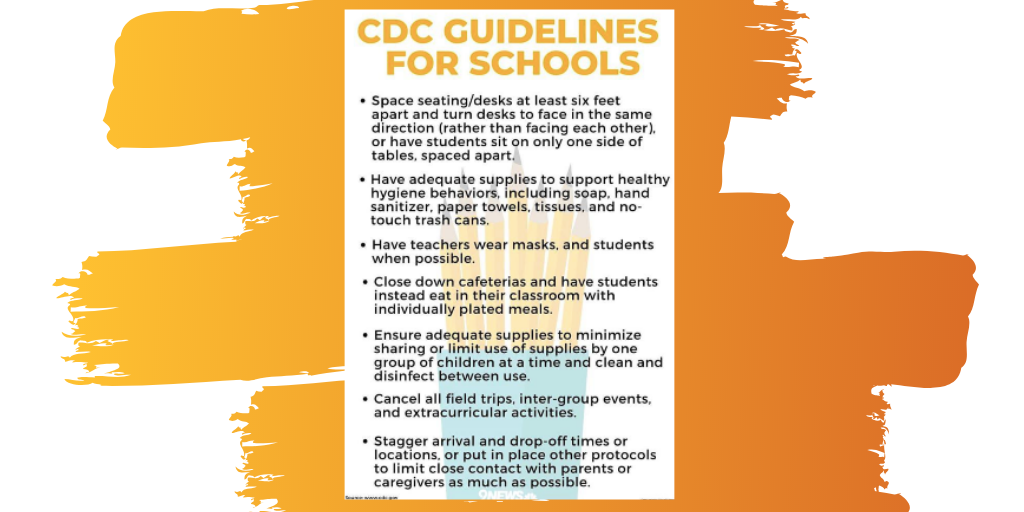
We also know that conferences are a BIG deal in the world of education. We look forward to opportunities such as ISTE, for example, to expand our professional learning network and engage in professional development. ISTE has already been postponed to November, but even then, what will the environment look like when there are typically over 16,000 attendees? Even if the conferences move forward as planned, will people still want to attend? It’s sad to consider how the social aspect, the after-parties and additional gatherings outside the convention hall, might be impacted. Other conferences such as Games for Change happening in July have moved to an online format. Some of these conferences are even free! While it will certainly be a different learning environment, we also recognize that this can open the door to increased opportunities for educators to attend who normally would not be able to. Additionally, moving conferences to an online format allows attendees to be more selective with the sessions they attend [no more worrying about saving 20+ minutes to run across the convention center to get to the next session!] and perhaps even increase engagement due to heightened interest in the presentations they can choose from.

Discovering creative ways to engage various types of learners: Some kiddos do really well with traditional instruction and assignments, but others do much better when they are given opportunities to demonstrate and explore their learning through a variety of modalities. Whether this be tech, art, or music… we are required to adapt our teaching methods and therefore try new approaches. For example, Steve discussed the Flipgrid Build Challenge where students from all over the world contribute to various challenges including creating a medical facility, inform the public/teach about COVID-19, create an escape room (like get into the bathroom to wash your hands!), and even building a model of the coronavirus. He even reported , “I learned more in an hour about COVID-19 than I have in all the news I watched”, in response to a submission that walked him through a museum that shared facts and information about the virus. Keep listening to hear more about some incredible ideas for further connecting with your students!
Stepping out of your comfort zone with new edtech opportunities: for many educators it feels like sink or swim with edtech at the moment. However, try to view this as a positive opportunity where you finally have the push you [maybe] needed to try something new! We’re all doing our very best right now, and everyone is taking “risks” with this new style of learning. Why not make the most of it and try out some new edtech that you’ve been meaning to dive into? Expanding beyond googlemeets or zoom will only further engage your students and enhance their learning. Let’s keep this going far beyond when things return to “normal”! Another interesting component of edtech is Esports, where students in various clubs complete with other schools. These opportunities, which existed before COVID-19, further demonstrate the power of edtech where they are still able to meet even when schools are closed! Steve also hosts a livestream for his Game Design and Development class, where he shares different tools that relate to content creation and invites various guests to participate such as professional game designers, educators, and students. He shares that, “There is so much happening that is really exciting right now. Even on these live streams, we have a lot of educators and students that are watching and interacting which provides an opportunity to learn with and from each other”. All of these livestreams are uploaded to Steve’s Youtube channel on the playlist: COVID-19 Learning at Home: Content Creation Tools. Be sure to check it out!
An opportunity for professional and personal development: This is a biggie. While we are all dealing with our own personal struggles during this time… we for sure are spending a LOT more time at home! Right now is a fantastic time to seek out personal and professional development opportunities. A bonus is that many of these opportunities are now temporarily offered at a reduced rate or even free! Check out livestreams, Twitter edchats, and blogs of educators that you follow on social media. Twitter alone is a valuable resource to make connections with other educators, exchange ideas, and learn about additional professional development opportunities.

People are the greatest resource: Now more than ever, we must realize the power of collaboration! How incredible is it that we have access to the internet: Twitter, Instagram, Facebook, Youtube… these are all incredible resources! “The internet was made for learning”, says Steve. We have to agree! At the very least, we suggest engaging with your personal learning network on Twitter and making an effort to join in live streams, Twitter chats, and to simply just join in conversation.
Focus on self-care and maintain this as we transition back to “normal”: We’re sure you’ve heard this one before, but as cliche as it sounds, SELF-CARE IS SO IMPORTANT! This means different things to different people: exercise, time in nature, sitting in a quiet space, reading, baking, taking a bath… but whatever it is, make time to do what makes you happy. Perhaps you love to take walks with your family, or plan movie nights. Whatever your choice - be sure to consistently check in with how you are taking care of yourself, and be sure to maintain these habits as we transition back to “normal”. Steve also shared about his experience with using online technology to stay connected with his friends. Online gaming is not just for kids!
Take advantage of [especially FREE] webinars: Steve was super enthusiastic to share about the benefits of webinars. Due to COVID-19, many are either free or extremely discounted. The best part is that you can choose from webinars that are pre recorded so that you can watch them on your own time, or join in to a live session and interact with all the other participants. You may be in a situation where you have more time now than you did before, and that special interest webinar is calling your name. For Steve, one of the webinars at the top of his list involves learning more about Unreal Engine. Think about it as an investment in your professional future… expanding and refining your skills will benefit both you and your students :)

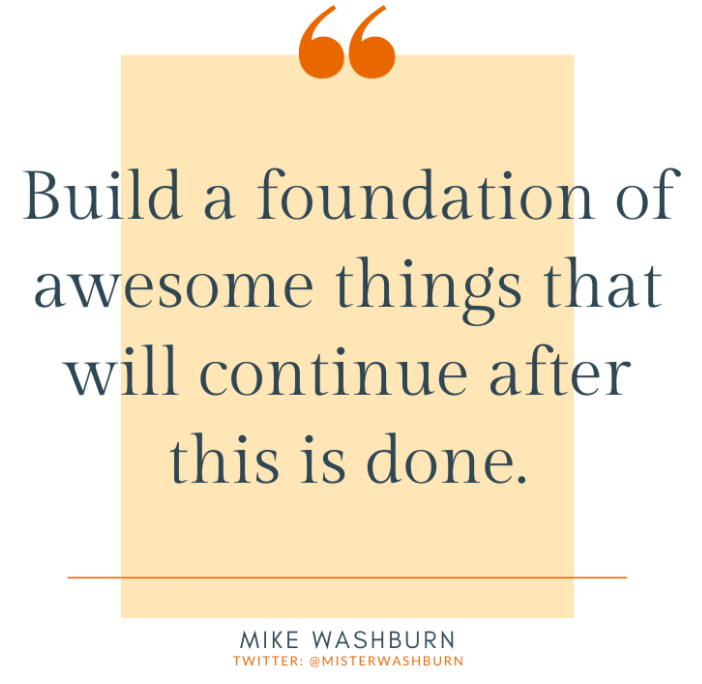
We understand that this is a difficult time for everyone. We want to emphasize the importance of focusing on the silver linings and positive opportunities that have come from this and will continue to come as we work through this situation together. All you can be expected to do is give your very best version of you to your family, students, and of course… yourself. Please be kind to yourself during this time. We look forward to hearing your comments in response to anything we discussed on the live chat! Please feel free to continue the conversation by responding in the comments below or on any of our social media channels.
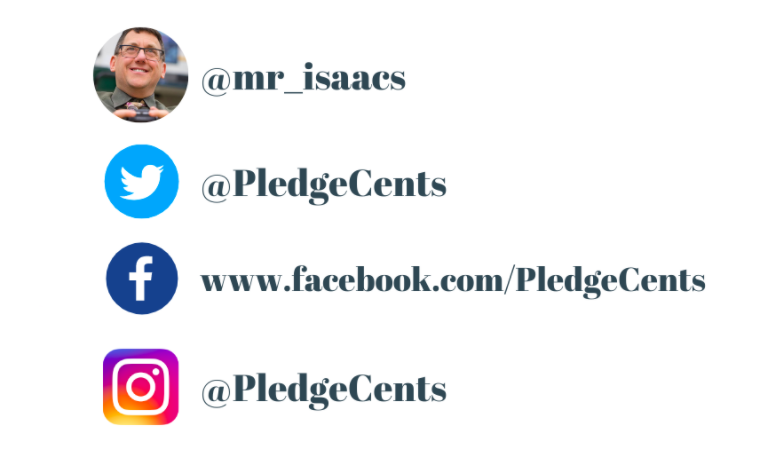

If you have any questions, email us at info@pledgecents.com.

